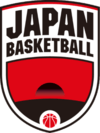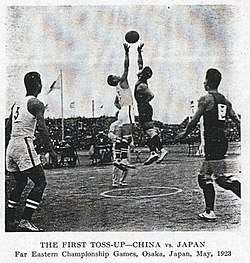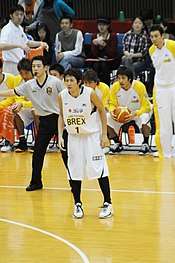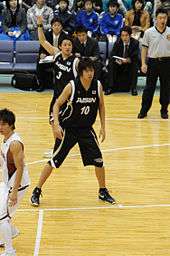Japan men's national basketball team
The Japan national basketball team is administered by the Japan Basketball Association (JBA). (Japanese: 日本バスケットボール協会)[2] A 1936 founding member of FIBA Asia, Japan has one of Asia's longest basketball traditions.
 | |||
| FIBA ranking | 40 | ||
|---|---|---|---|
| Joined FIBA | 1936 | ||
| FIBA zone | FIBA Asia | ||
| National federation | Japan Basketball Association | ||
| Coach | Julio Lamas | ||
| Olympic Games | |||
| Appearances | 6 | ||
| Medals | None | ||
| FIBA World Cup | |||
| Appearances | 6 | ||
| Medals | None | ||
| Asian Championships | |||
| Appearances | 28 | ||
| Medals | |||
| Asian Games | |||
| Appearances | 16 | ||
| Medals | |||
|
| |||




Japan has one of the most successful basketball teams in Asia. It has won the Asian Basketball Championships twice and is the second leading nation in qualifications to the event. The team qualified for the Olympic Games six times and for the FIBA World Cup four times.
Japan has traditionally brought forth several of Asia's elite basketball players who competed in the NBA and in Europe. These players include Yuta Tabuse, J.R. Sakuragi, Takuya Kawamura, Takumi Ishizaki and others. However, for about two decades, they rarely played for the national team, which caused Team Japan to fall behind Asia's elite competition from Iran, South Korea, the Philippines and China.
In 2014, Yuta Tabuse and several of Japan's top players returned to the national team and helped to reach its best finish in almost 20 years.
History
Japan's national team had its first international tournament at the 3rd Far Eastern Games held in Tokyo in 1917. Japan representative at this time was the team of the Kyoto YMCA. Later, the team was a founding member of the Olympics Basketball competition in Berlin 1936. Henceforth, they participated almost every time until 1976. Team Japan was a regular at world tournaments. It had its debut at the FIBA World Championship in 1963. It was the top team in Asia, as it won the championship there in 1965 and 1971. Since the rise of China, Japan declined a little bit and appearances at global events became scarcer.
As runner-up at the Fukuoka Universiade in 1995, Team Nippon (as the Japanese are also called) had a streak of success and qualified for the 1998 FIBA World Championship, its first qualification in over 30 years. Coached by the Croat Željko Pavličević, the team played well but did not make it out of the primary round, where it lost its fourth-place battle against former Semi-finalist New Zealand.
In recent years, Japan played against more intense competition from the Middle East. Combined with many player absences from the team, Team Nippon struggled to win medals at the Asian Championships since its silver medal in 1997. At the 2008 event in their home country (Tokushima), the team finished at the 8th position and missed qualification for both the Beijing Olympic Tournament and qualification to the 2010 FIBA World Championship. At the 2009 FIBA Asia tournament the team sank to No. 10 position, its worst performance. This was partly due to the change of the head coach just before the tournament.
To better the results, the American coach Thomas Wisman took over the management of the team in 2010 and made some considerable improvements. Wisman just came off a phenomenal year in the Japanese Basketball League (JBL) where he had led Tochigi Brex to its first and only national title. At the FIBA Asia Stankovic Cup in 2010, Team Nippon was defeated by host Lebanon but exceeded expectations as it finished as runner-up. At the 2011 FIBA Asia Championship, the listed goal of the Final Four was missed as the team reached the 7th position out of 15. The team managed to defeat finalists, Jordan, but then had to play Korea in the first playoff round and were defeated.
In March 2012, the Japan Association dismissed Wissmann and the country's coaching legend Kimikazu Suzuki took over the reins of the team. Suzuki, concurrently coaching the Aisin SeaHorses Mikawa had initial success as Team Nippon finished Runner-up at the next FIBA Asian Cup which was held in Tokyo in September 2012. Aimed at the acquisition of a 2014 FIBA World Cup berth, the team finished the 2013 FIBA Asia Championship at the 9th position where it lost its last three games. Japan will co-host the 2023 FIBA Basketball World Cup along with Philippines and Indonesia.
Competitive record
Olympic Games
| Year | Position | Tournament | Host |
|---|---|---|---|
| 1936 | 9 | Basketball at the 1936 Summer Olympics | Berlin, Germany |
| 1956 | 10 | Basketball at the 1956 Summer Olympics | Melbourne, Australia |
| 1960 | 15 | Basketball at the 1960 Summer Olympics | Rome, Italy |
| 1964 | 10 | Basketball at the 1964 Summer Olympics | Tokyo, Japan |
| 1972 | 14 | Basketball at the 1972 Summer Olympics | Munich, Germany |
| 1976 | 11 | Basketball at the 1976 Summer Olympics | Montreal, Canada |
| 2020 | Qualified as host[3] | Basketball at the 2020 Summer Olympics | Tokyo, Japan |
FIBA Basketball World Cup
| FIBA World Cup Record | |||||
|---|---|---|---|---|---|
| Year | Position | Pld | W | L | |
| Did not qualify | |||||
| Preliminary round | 3 | 1 | 2 | ||
| Classification round | 8 | 2 | 6 | ||
| Did not qualify | |||||
| Classification round | 4 | 0 | 4 | ||
| Did not qualify | |||||
| Preliminary round | 5 | 1 | 4 | ||
| Did not qualify | |||||
| Preliminary round | 3 | 0 | 3 | ||
| Qualified as co-hosts | |||||
| Total | 11th place | 0 | 0 | 0 | |
Asian Championship
| Year | Rank | P | W | L | PF | PA | PD |
|---|---|---|---|---|---|---|---|
| – | – | – | – | – | – | ||
| – | – | – | – | – | – | ||
| – | – | – | – | – | – | ||
| – | – | – | – | – | – | ||
| – | – | – | – | – | – | ||
| – | – | – | – | – | – | ||
| – | – | – | – | – | – | ||
| – | – | – | – | – | – | ||
| – | – | – | – | – | – | ||
| – | – | – | – | – | – | ||
| – | – | – | – | – | – | ||
| – | – | – | – | – | – | ||
| – | – | – | – | – | – | ||
| – | – | – | – | – | – | ||
| – | – | – | – | – | – | ||
| – | – | – | – | – | – | ||
| – | – | – | – | – | – | ||
| – | – | – | – | – | – | ||
| – | – | – | – | – | – | ||
| – | – | – | – | – | – | ||
| – | – | – | – | – | – | ||
| – | – | – | – | – | – | ||
| – | – | – | – | – | – | ||
| – | – | – | – | – | – | ||
| – | – | – | – | – | – | ||
| – | – | – | – | – | – | ||
| – | – | – | – | – | – | ||
| – | – | – | – | – | – | ||
| – | – | – | – | – | – | ||
| Total | /29 |
FIBA Asia Cup
Asian Games
|
East Asian Games
|
Team
Current Roster
2021 FIBA Asia Cup qualification
Opposition: Chinese Taipei (February 21)
Venue: Heping Basketball Gymnasium, Taipei[4]
| Japan national basketball team – 2021 FIBA Asia Cup qualification roster | ||||||||||||||||||||||||||||||||||||||||||||||||||||||||||||||||||||||||||||||||||||||||||||
|---|---|---|---|---|---|---|---|---|---|---|---|---|---|---|---|---|---|---|---|---|---|---|---|---|---|---|---|---|---|---|---|---|---|---|---|---|---|---|---|---|---|---|---|---|---|---|---|---|---|---|---|---|---|---|---|---|---|---|---|---|---|---|---|---|---|---|---|---|---|---|---|---|---|---|---|---|---|---|---|---|---|---|---|---|---|---|---|---|---|---|---|---|
| Players | Coaches | |||||||||||||||||||||||||||||||||||||||||||||||||||||||||||||||||||||||||||||||||||||||||||
|
| |||||||||||||||||||||||||||||||||||||||||||||||||||||||||||||||||||||||||||||||||||||||||||
Past Roster
This is the Japan national basketball team for the 2019 FIBA Basketball World Cup.
Japan national basketball team – 2019 FIBA Basketball World Cup roster | ||||||||||||||||||||||||||||||||||||||||||||||||||||||||||||||||||||||||||||||||||||||||||||
|---|---|---|---|---|---|---|---|---|---|---|---|---|---|---|---|---|---|---|---|---|---|---|---|---|---|---|---|---|---|---|---|---|---|---|---|---|---|---|---|---|---|---|---|---|---|---|---|---|---|---|---|---|---|---|---|---|---|---|---|---|---|---|---|---|---|---|---|---|---|---|---|---|---|---|---|---|---|---|---|---|---|---|---|---|---|---|---|---|---|---|---|---|
| Players | Coaches | |||||||||||||||||||||||||||||||||||||||||||||||||||||||||||||||||||||||||||||||||||||||||||
}
|
| |||||||||||||||||||||||||||||||||||||||||||||||||||||||||||||||||||||||||||||||||||||||||||
Depth Chart
| Pos. | Starting 5 | Bench 1 | Bench 2 |
|---|---|---|---|
| C | Nick Fazekas | Kosuke Takeuchi | Avi Schafer |
| PF | Rui Hachimura | Joji Takeuchi | |
| SF | Yuta Watanabe | Yudai Baba | |
| SG | Daiki Tanaka | Seiya Ando | Shuto Ando |
| PG | Ryusei Shinoyama | Makoto Hiejima |
Team B
| Japan men's national basketball team B – 2019 William Jones Cup roster | |||||||||||||||||||||||||||||||||||||||||||||||||||||||||||||||||||||||||||||||||||||||||||||||||||
|---|---|---|---|---|---|---|---|---|---|---|---|---|---|---|---|---|---|---|---|---|---|---|---|---|---|---|---|---|---|---|---|---|---|---|---|---|---|---|---|---|---|---|---|---|---|---|---|---|---|---|---|---|---|---|---|---|---|---|---|---|---|---|---|---|---|---|---|---|---|---|---|---|---|---|---|---|---|---|---|---|---|---|---|---|---|---|---|---|---|---|---|---|---|---|---|---|---|---|---|
| Players | Coaches | ||||||||||||||||||||||||||||||||||||||||||||||||||||||||||||||||||||||||||||||||||||||||||||||||||
}
|
| ||||||||||||||||||||||||||||||||||||||||||||||||||||||||||||||||||||||||||||||||||||||||||||||||||
Head coaches








































Past rosters
- Scroll down to see more.
1936 Olympic Games: finished 13th among 21 teams
Riichi Cho, T.Nakae, S.Ri, K.Yokoyama, T.Kanakogi, M.Maeda, U.Munakata, S.Matsui
1956 Olympic Games: finished 10th among 15 teams
Setsuo Nara, Jose Rodriguez, Kenichi Imaizumi, Hiroshi Saito, Reizo Ohira, Hitoshi Konno, Takashi Itoyama, Manabu Fujita, Takeo Sugiyama, Tetsuro Noborisaka, Riichi Arai (Coach: M.Maeda)
1960 Olympic Games: finished 15th among 16 teams
Setsuo Nara, Shutaro Shoji, Hiroshi Saito, Takashi Itoyama, Takeo Sugiyama, Kenichi Imaizumi, Yasukuni Oshima, Shoji Kamata, Masashi Shiga, Takashi Masuda, Kaoru Wakabayashi, Hideo Kanekawa (Coach: M.Maeda)
1963 World Championship: finished 13th among 13 teams
Setsuo Nara, Takashi Masuda, Masashi Shiga, Yasukuni Oshima, Kaoru Wakabayashi, Keizo Okayama, Isamu Yamaguchi, Yoshikuni Awano, Fumihiko Moroyama, Katsuji Tsunoda, Kunihiko Nakamura, Yoshitaka Egawa (Coach: Shiro Yoshii)
1964 Olympic Games: finished 10th among 16 teams
Takashi Masuda, Setsuo Nara, Masashi Shiga, Kaoru Wakabayashi, Fumihiko Moroyama, Katsuji Tsunoda, Kunihiko Nakamura, Yoshitaka Egawa, Nobuo Kaiho, Akira Kodama, Katsuo Bai, Seiji Fujie (Coach: Marco Antonio de Venetis)
1967 World Championship: finished 11th among 13 teams
Kaoru Wakabayashi, Fumihiko Moroyama, Kunihiko Nakamura, Yoshitaka Egawa, Akira Kodama, Masatomo Taniguchi, Nobuo Hattori, Kenji Soda, Masahiko Yoshida, Isao Kimura, Seiji Igarashi (Coach: Shutaro Shoji)
1972 Olympic Games: finished 14th among 16 teams
Kenji Soda, Masatomo Taniguchi, Nobuo Hattori, Kunihiko Yokoyama, Atsushi Somamoto, Hirofumi Numata, Shigeaki Abe, Mineo Yoshikawa, Kazufumi Sakai, Nobuo Chigusa, Satoshi Mori, Katsuhiko Sugita (Coach: S.Kasahara)
1976 Olympic Games: finished 11th among 12 teams
Hirofumi Numata, Shigeaki Abe, Satoshi Mori, Norihiko Kitahara, Hideki Hamaguchi, Kiyohide Kuwata, Koji Yamamoto, Yutaka Fujimoto, Shigeto Shimizu, Fumio Saito, Nobuo Chigusa, Shoji Yuki (Coach: Masahiko Yoshida)
1998 World Championship: finished 14th among 16 teams
Kenichi Sako, Maikeru Takahashi, Akifumi Yamasaki, Hiroshi Nagano, Makoto Hasegawa, Takehiko Orimo, Satoshi Sakumoto, Hiroyuki Tominaga, Takahiro Setsumasa, Makoto Minamiyama, Takeshi Yuki, Satoru Furuta (Coach: Mototaka Kohama)
2006 World Championship: finished 20th among 24 teams
Takehiko Orimo, Satoru Furuta, Takahiro Setsumasa, Shunsuke Ito, Joji Takeuchi, Kei Igarashi, Shinsuke Kashiwagi, Daiji Yamada, Ryota Sakurai, Kosuke Takeuchi, Takuya Kawamura, Tomoo Amino (Coach: Zeljko Pavlicevic)
Roster for the 2016 FIBA World Olympic Qualifying Tournaments:[8]
| Japan men's national basketball team roster | |||||||||||||||||||||||||||||||||||||||||||||||||||||||||||||||||||||||||||||||||||||||||||
|---|---|---|---|---|---|---|---|---|---|---|---|---|---|---|---|---|---|---|---|---|---|---|---|---|---|---|---|---|---|---|---|---|---|---|---|---|---|---|---|---|---|---|---|---|---|---|---|---|---|---|---|---|---|---|---|---|---|---|---|---|---|---|---|---|---|---|---|---|---|---|---|---|---|---|---|---|---|---|---|---|---|---|---|---|---|---|---|---|---|---|---|
| Players | Coaches | ||||||||||||||||||||||||||||||||||||||||||||||||||||||||||||||||||||||||||||||||||||||||||
}
|
| ||||||||||||||||||||||||||||||||||||||||||||||||||||||||||||||||||||||||||||||||||||||||||
At the 2016 FIBA Asia Challenge.[9]
| Japan men's national basketball team - 2016 FIBA Asia Challenge roster | ||||||||||||||||||||||||||||||||||||||||||||||||||||||||||||||||||||||||||||||||||||||||||||
|---|---|---|---|---|---|---|---|---|---|---|---|---|---|---|---|---|---|---|---|---|---|---|---|---|---|---|---|---|---|---|---|---|---|---|---|---|---|---|---|---|---|---|---|---|---|---|---|---|---|---|---|---|---|---|---|---|---|---|---|---|---|---|---|---|---|---|---|---|---|---|---|---|---|---|---|---|---|---|---|---|---|---|---|---|---|---|---|---|---|---|---|---|
| Players | Coaches | |||||||||||||||||||||||||||||||||||||||||||||||||||||||||||||||||||||||||||||||||||||||||||
}
|
| |||||||||||||||||||||||||||||||||||||||||||||||||||||||||||||||||||||||||||||||||||||||||||
Kit
Manufacturer
2015-2019: Under Armour [10]
See also
- Japan women's national basketball team
- Japan national under-19 basketball team
- Japan national under-17 basketball team
- Japan national 3x3 team
References
- "FIBA Ranking Presented by Nike". FIBA. 3 March 2020. Retrieved 3 March 2020.
- http://www.fiba.com/pages/eng/fc/FIBA/fibaStru/nfLeag/nfProf.asp?nationalFederationNumber=309
- "Japan launch search for new coach after Hasegawa departure". FIBA. 2 December 2016. Retrieved 8 December 2016.
"The JBA is not guaranteed participation in the 2020 Tokyo Olympic Games as the host country and has already begun a restructuring (of the program) and strengthening activities towards the 2019 FIBA World Cup and 2020 and beyond," Higashino said.
- "Malaysia at the FIBA Asia Cup 2021 Qualifiers". FIBA.basketball.
- "Japan hoops set to hire Hasegawa". The Japan Times. Retrieved 23 September 2014.
- "Japan launch search for new coach after Hasegawa departure". FIBA. 2 December 2016. Retrieved 8 December 2016.
- "Basketball: World Cup qualification could prove turning point for Japan". Joel Fitzpatrick/Kyodod News+. 26 February 2019. Retrieved 19 May 2020.
- http://www.fiba.com/oqt/serbia/2016/news/japan-select-12-men-to-chase-olympic-dream
- Japan - FIBA Asia Challenge 2016, FIBA.COM. Accessed 13 February 2017.
- 2015 FIBA Asia Championship - Japan, FIBA.com, Retrieved 27 September 2015.
- Fiba Asia Cup 2017, FIBA.com, accessed 21 August 2017.
External links
- Official website
- FIBA profile
- Japan Basketball Records at FIBA Archive
Videos
- Japan - Highlights - 2015 FIBA Asia Championship Youtube.com video
- Japan Offense Highlights - FIBA Asia Cup 2017 Youtube.com video